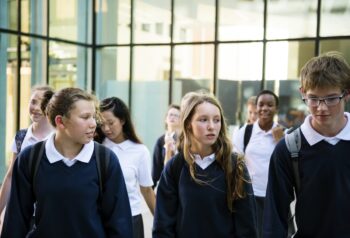 A Catholic school admissions policy that not only prioritises children from Catholic backgrounds but also children from other Christian backgrounds over children who are or were in care breaches the School Admissions Code, the admissions tribunal has found. However, despite acknowledging that the school is ‘less ethnically diverse’ and ‘has lower levels of [pupils on] Free School Meals’ (FSM) than most other schools in the area, it stopped short of ruling that this was unfair.
A Catholic school admissions policy that not only prioritises children from Catholic backgrounds but also children from other Christian backgrounds over children who are or were in care breaches the School Admissions Code, the admissions tribunal has found. However, despite acknowledging that the school is ‘less ethnically diverse’ and ‘has lower levels of [pupils on] Free School Meals’ (FSM) than most other schools in the area, it stopped short of ruling that this was unfair.
Humanists UK – which campaigns for all state-funded schools to be open to local families irrespective of parents’ religion or belief – said the decision illustrates that the Code does not go far enough and urged the Government to update it to make sure all children have fair access to a good school place.
The Office of the Schools Adjudicator (OSA) – which is responsible for making sure schools stick to admissions rules in England – ruled that Richard Challoner School in Kingston upon Thames broke the School Admissions Code by failing to prioritise all children who are or were in care over all those who don’t share the faith, which includes pupils from Christian backgrounds that aren’t Catholic. At present, the school’s policy reserves 12 places to applicants who ‘are members of other Christian denominations’, but does not first give priority for those places to children who are or were in care. The school also prioritises ‘baptised Catholics’ over all children who are or were in care but are not baptised. Unfortunately, however, this practice is permitted by the Code.
The adjudicator rejected a complaint arguing the use of Catholic feeder schools meant that the intake at Richard Challoner was unfair to children with English as an additional language (EAL) and those on free school meals (FSM). However, the decision acknowledges that the school ‘does have a less diverse and less deprived intake than other schools in the area’ and that ‘the only schools with a smaller proportion of children eligible for FSM than the school are the two selective schools’. The evidence shows that religious selection causes selection by income and ethnicity.
The adjudicator also ruled that the policy was insufficiently clear about the period of time before making their application families were expected to attend weekly worship at a Church, which is used as a tie-breaker in the event there are more religious applicants than places. The decision did not pick up on the fact that previous OSA decisions have found that a requirement for weekly worship is ‘unreasonable’.
Humanists UK Education Campaigns Manager Dr Ruth Wareham commented:
‘The OSA’s ruling in this case shows exactly why the School Admissions Code needs updating if all children are to have fair access to a good school place. The Adjudicator was able to highlight that Richard Challoner’s policy unfairly prioritised children from non-Catholic backgrounds over vulnerable children who are or were in care. But the Code explicitly allows religious selection even when this causes ethnic or socio-economic selection.
‘It is clearly wrong that state-funded institutions should be able to side-step their duties to vulnerable and disadvantaged children. We call on the Government to rectify this situation and put an end to faith-based admissions policies for good.’
Notes:
For further comment or information, please contact Humanists UK Education Campaigns Manager Ruth Wareham at ruth@humanists.uk or phone 020 7324 3000 or 07725 110 860.
Read the full Office of the Schools Adjudicator decision.
Read our most recent article on the faith school forbidding pupils and their mothers from wearing ‘very straight dresses or skirts’ that breached Admissions Code.
Read our article on the faith school requiring weekly church attendance deemed ‘unreasonable’ by the admissions tribunal.
Read more about our work on faith schools and religious selection.
Humanists UK is the national charity working on behalf of non-religious people. Powered by 100,000 members and supporters, we advance free thinking and promote humanism to create a tolerant society where rational thinking and kindness prevail. We provide ceremonies, pastoral care, education, and support services benefitting over a million people every year and our campaigns advance humanist thinking on ethical issues, human rights, and equal treatment for all.
